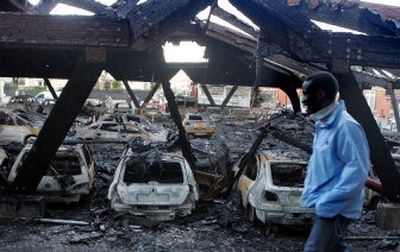Violence in France reaches Paris

PARIS – The urban unrest that triggered scores of arson attacks on vehicles, nursery schools and other targets from the Mediterranean to the German border reached Paris overnight, with police saying early today that 13 cars were burned in the French capital.
By 1 a.m., at least 607 vehicles – including those in Paris – were burned during the 10th night of violence, said Patrick Hamon, spokesman for the national police. The overall figures were expected to climb by daybreak.
The violence – originally concentrated in neighborhoods northeast of Paris with large immigrant populations – has spread across France, extending west to the rolling fields of Normandy and south to resort cities on the Mediterranean. Attacks were reported in Cannes and Nice.
In the Normandy town of Evreux, arsonists burned at least 50 vehicles, part of a shopping center, a post office and two schools, Hamon said.
Five police officers and three firefighters were injured battling the blazes, he said.
The unrest is forcing France to confront long-simmering anger in its suburbs, where many Africans and their French-born children live on society’s margins, struggling with unemployment, poor housing, racial discrimination, crime and a lack of opportunity.
Police deployed a helicopter and tactical teams to chase down youths speeding from one attack to another in cars and on motorbikes. Some 2,300 police were brought into the Paris region to bolster security, France-Info said. More than 250 people were arrested.
The violence erupted Oct. 27 following the accidental electrocution of two teenagers who hid in a power substation, apparently believing police were chasing them.
The anger spread to the Internet, with blogs mourning the youths.
Along with messages of condolence and appeals for calm were insults targeting police, threats of more violence and warnings that the unrest will feed support for France’s anti-immigration extreme right.
“Civil war is declared. There will no doubt be deaths. Unfortunately, we have to prepare,” said a posting signed “Rania.”
“We are going to destroy everything. Rest in peace, guys,” wrote “Saint Denis.”
The unrest reached Paris late Saturday. Hamon had no immediate information on the neighborhoods where the vehicles were torched. Paris police headquarters said three cars were damaged by fire in the Republique section, northeast of City Hall.
“It’s copycat acts,” Hamon said. “All these hoodlums see others setting fires and say they can do it, too.”
Evreux, 60 miles to the west, appeared to suffer the worst damage Saturday. The burning of the shopping center showed that “there is a will to pillage,” Hamon said. “This has been true since the start,” referring to grocery stores, video stores and other businesses that have been set afire.
The unrest has taken on unprecedented scope and intensity, reaching far-flung corners of France on Saturday, from Rouen in Normandy to Bordeaux in the southwest to Strasbourg near the German border.
However, the Paris region has borne the brunt.
In quiet Acheres, on the edge of the St. Germain forest west of Paris, arsonists burned a nursery school, where part of the roof caved in, and about a dozen cars in attacks the mayor described as “perfectly organized.”
Children’s photos clung to the blackened walls, and melted plastic toys littered the floor. Residents gathered at the school gate, demanding that the army be deployed or suggesting that citizens band together to protect their neighborhoods.